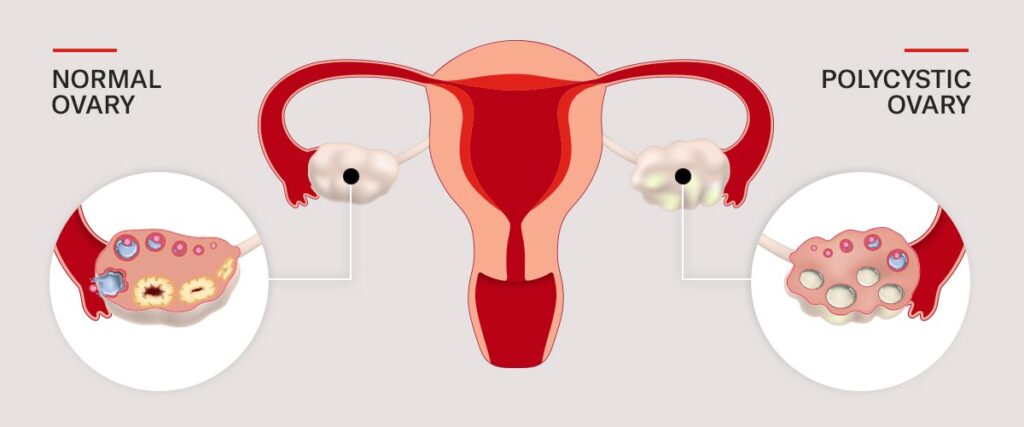Polycystic Ovary Syndrome (PCOS) is a prevalent hormonal disorder affecting millions of women worldwide. Characterized by irregular menstrual cycles, excessive hair growth, and various metabolic challenges, PCOS is a complex condition that requires a comprehensive understanding to manage effectively. This guide delves into the symptoms, causes, and treatment options available for those dealing with PCOS.

What is PCOS?
PCOS, or Polycystic Ovary Syndrome, is a hormonal disorder commonly diagnosed in women of reproductive age. The condition is marked by an overproduction of androgens (male hormones) and often involves multiple small cysts developing on the ovaries. These hormonal imbalances can lead to a variety of symptoms and complications if left untreated.
Understanding the Symptoms of PCOS
Women with PCOS may experience a range of symptoms, which can vary in severity:
- Irregular Menstrual Cycles:
- One of the most common signs of PCOS is an irregular menstrual cycle. Women may experience fewer than nine periods a year, abnormally heavy periods, or prolonged periods.
- Excessive Hair Growth (Hirsutism):
- Due to elevated levels of androgens, women with PCOS may experience excessive hair growth on the face, chest, back, and other areas where men typically grow hair.
- Acne and Oily Skin:
- Hormonal imbalances can lead to acne, particularly on the face, chest, and upper back. Skin may also become oilier than usual.
- Weight Gain and Difficulty Losing Weight:
- Many women with PCOS struggle with weight gain, particularly around the abdomen, and find it challenging to lose weight despite diet and exercise.
- Thinning Hair or Hair Loss:
- PCOS can cause thinning of the hair on the scalp, a condition known as androgenic alopecia.
- Fertility Issues:
- Due to irregular ovulation or lack of ovulation, women with PCOS may face challenges when trying to conceive.
What Causes PCOS?
The exact cause of PCOS remains unclear, but several factors are believed to play a role:
- Genetic Factors:
- PCOS often runs in families, suggesting a genetic component to the condition.
- Insulin Resistance:
- Many women with PCOS have insulin resistance, where the body’s cells do not respond effectively to insulin. This can lead to elevated blood sugar levels and an increased risk of type 2 diabetes.
- Hormonal Imbalances:
- High levels of androgens can prevent the ovaries from releasing eggs during each menstrual cycle, leading to the formation of cysts.
- Inflammation:
- Low-grade inflammation is common in women with PCOS and has been linked to increased androgen production.
Effective Treatment Options for PCOS
Managing PCOS typically involves a combination of lifestyle changes, medications, and, in some cases, surgical interventions. Treatment plans should be tailored to the individual, depending on the symptoms and whether the woman is trying to conceive.
Lifestyle Modifications:
- Diet and Exercise:
- A balanced diet rich in whole foods, low in processed sugars, and high in fiber can help manage insulin levels and support weight loss. Regular exercise is also crucial in managing symptoms and improving overall health.
- Weight Management:
- Even a modest reduction in weight can improve symptoms like irregular periods and insulin resistance.
Medications:
- Hormonal Birth Control:
- Birth control pills, patches, or rings can regulate menstrual cycles and reduce androgen levels, helping with symptoms like acne and excessive hair growth.
- Anti-Androgen Medications:
- These medications can help reduce hair growth and clear up acne by blocking the effects of androgens.
- Metformin:
- Often prescribed for insulin resistance, metformin can help with weight loss, regulate menstrual cycles, and lower the risk of type 2 diabetes.
Fertility Treatments:
- Ovulation Induction:
- For women trying to conceive, medications like clomiphene citrate or letrozole may be prescribed to stimulate ovulation.
- In Vitro Fertilization (IVF):
- In cases where ovulation induction is not successful, IVF may be considered.
Surgical Options:
- Laparoscopic Ovarian Drilling (LOD):
- This minimally invasive procedure may be recommended for women who do not respond to ovulation induction. LOD involves creating tiny holes in the ovaries to reduce androgen production and stimulate ovulation.
- At Indigo Women’s Center, this procedure is expertly performed by Dr. Surakshith Battina, ensuring patients receive the highest standard of care with a focus on successful outcomes and minimal recovery time.
Conclusion: Taking Control of Your Health with PCOS
Living with PCOS can be challenging, but understanding the condition and working closely with your healthcare provider can make a significant difference. With the right combination of lifestyle changes, medical treatment, and support, women with PCOS can lead healthy, fulfilling lives.
Call to Action:
If you suspect you have PCOS or are struggling with symptoms, don’t hesitate to seek expert care. Indigo Women’s Center, led by Dr. Surakshith Battina, offers comprehensive diagnosis and personalized treatment plans, including advanced procedures like Laparoscopic Ovarian Drilling. Take the first step towards better health and book your consultation today. 📞 Call us at +91 72991 09555





